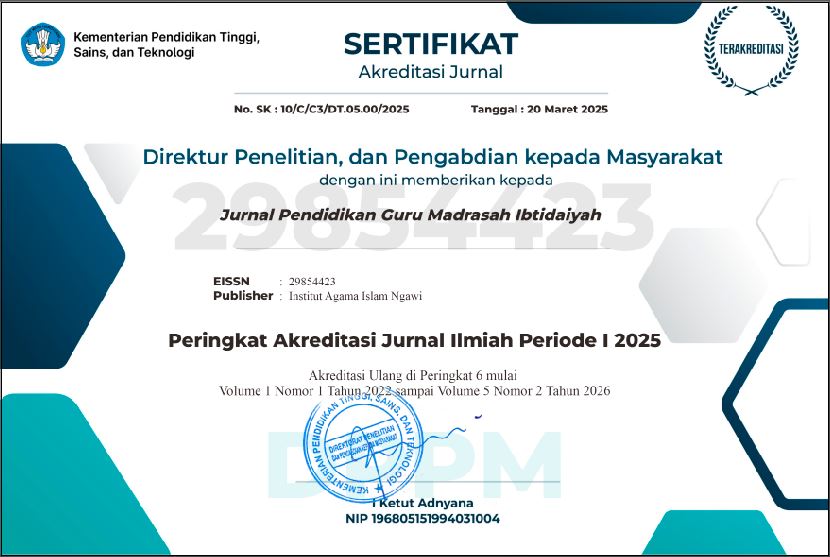EFEKTIVITAS INQUIRY BASED LEARNING DALAM MENINGKATKAN KEMAMPUAN LITERASI DAN NUMERISASI DI SEKOLAH TINGKAT DASAR
DOI:
https://doi.org/10.56997/pgmi.v3i1.1644Keywords:
Inquiry-Based Learning, Literacy, Numeracy, Active Learning, Elementary Education.Abstract
The inquiry-based learning (IBL) model is an educational approach that places students at the center of the learning process, where they are actively involved in exploration, questioning, investigation, and discovering solutions to their problems. This research aims to evaluate the effectiveness of IBL in improving literacy and numeracy skills among elementary school students. Literacy encompasses the ability to read critically and understand information, while numeracy involves understanding mathematical concepts and skills in problem-solving. This research uses a qualitative approach with a literature study method, where data is obtained from various scientific articles, books, and relevant research reports. The study results show that IBL can enhance critical thinking, analytical skills, and a deep understanding of literacy and numeracy concepts compared to conventional learning models. Although it has many advantages, implementing IBL faces challenges such as the need for more time and limited resources, especially in procuring experimental tools. Therefore, it is recommended that teachers receive special training and adequate resource support to optimize the implementation of IBL in elementary schools
References
Awami, F., Yuhana, Y., & Nindiasari, H. (2022). Meningkatkkan Kemampuan Literasi Numerasi Dengan Model Problem Based Learning (PBL) Ditinjau Dari Self Confidence Siswa SMK. MENDIDIK: Jurnal Kajian Pendidikan Dan Pengajaran, 8(2), 231–243. https://doi.org/10.30653/003.202282.236
Badjeber, R., & Fatimah, S. (2015). Peningkatan Kemampuan Koneksi Matematis Siswa Smp Melalui Pembelajaran Inkuiri Model Alberta. Jurnal Pengajaran Matematika Dan Ilmu Pengetahuan Alam, 20(1), 18. https://doi.org/10.18269/jpmipa.v20i1.557
Irfan Sugianto , Savitri Suryandari, L. D. A. (2020). EFEKTIVITAS MODEL PEMBELAJARAN INKUIRI TERHADAP KEMANDIRIAN BELAJAR SISWA DI RUMAH, 1(3), 159–170.
Kartika, Y. K., & Rakhmawati, F. (2022). Peningkatan Kemampuan Berpikir Kritis Matematis Siswa Menggunakan Model Inquiry Learning. Jurnal Cendekia : Jurnal Pendidikan Matematika, 6(3), 2515–2525. https://doi.org/10.31004/cendekia.v6i3.1627
Moh Slamet Sutrimo, Sajdah, S. N., Sinambela, Y. V. F., & Bagas, R. (2024). Peningkatan literasi numerasi melalui model pembelajaran dan hubungannya dengan kemampuan self-efficacy: Systematic literatur review. JPMI (Jurnal Pembelajaran Matematika Inovatif), 7(1), 61–72. https://doi.org/10.22460/jpmi.v7i1.21650
Mulyono, H., & Halim, N. (2015). Literasi Informasi Dan Kritis: Urgensi, Perspektif Islam, Dan Integrasi Dalam Kurikulum Pendidikan. Jurnal Tarbiyah, 22(2), 313–329. Retrieved from http://dx.doi.org/10.30829/tar.v22i2.30
Nurcahyono, N. A. (2023). Peningkatan Kemampuan Literasi Numerasi Melalui Model Pembelajaran. Hexagon: Jurnal Ilmu Dan Pendidikan Matematika, 1(1), 20. https://doi.org/10.33830/hexagon.v1i1.4924
Purwanti, K. L. (2016). Matematika Mahasiswa Calon Guru MI. Seminar Nasional Matematika X Universitas Negeri Semarang 2016, 466–480.
Saputra, H., Al Auwal, T. M. R., & Mustika, D. (2017). Pembelajaran Inkuiri Berbasis Virtual Laboratory Untuk Meningkatkan Kemampuan Literasi Sains Mahasiswa Calon Guru Pendidikan Fisika Universitas Samudra. Jurnal IPA & Pembelajaran IPA, 1(2), 143–148. https://doi.org/10.24815/jipi.v1i2.9688
Sudarta. (2022). PENERAPAN MODEL PEMBELAJARAN INKUIRI UNTUK MENINGKATKAN KEMAMPUAN MENULIS DAN PRESTASI BELAJAR, 16(1), 1–23.
Wati, U. (2022). Penerapan Model Pembelajaran Stad Untuk Meningkatkan Aktivitas Dan Hasil Belajar Siswa. Jurnal Math-UMB.EDU, 9(2), 76–82. https://doi.org/10.36085/mathumbedu.v9i2.3213
Downloads
Published
Issue
Section
License
Copyright (c) 2025 Akbar Haqul Yaqin

This work is licensed under a Creative Commons Attribution 4.0 International License.
Jurnal PGMI : Jurnap Pendidikan Guru Madrasah Ibtidaiyah CC-BY or an equivalent license as the optimal license for the publication, distribution, use, and reuse of scholarly work.







